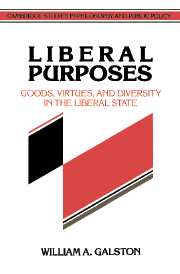Book contents
13 - Partisanship and inclusion
Published online by Cambridge University Press: 05 June 2012
Summary
Throughout this book, I have sought to argue against neutralist accounts of liberalism and to replace them with an account focused on liberal goods and virtues and on the means whereby they may be attained (or engendered). A leitmotif of my critique has been what I see as a subtle irony: Neutralist liberalism, whose guiding intention is the widest possible inclusiveness for differing ways of life subject only to the requirements of social justice, turns out to be far more partisan and exclusionary than its proponents are readily willing to admit. The substantive liberalism I advocate, by contrast, is actually less biased against many ways of life than is the thesis I reject. In this respect, among others, it is more political than is the self-styled “political liberalism.”
In this concluding chapter, I focus on the complex interplay of partisanship and inclusion. Section I explores the extent to which liberal principles of public justice can and do shape the content of private lives and associations. Section II discusses ways of minimizing moral coercion in liberal polities. Section III indicates how the characteristic outcomes produced by liberal principles and institutions can be deployed to develop a normatively substantive and empirically realistic defense of liberal politics.
As we saw in Chapter 5, political liberals such as John Rawls and Charles Larmore acknowledge that liberal regimes do not (and cannot) satisfy the requirements of “neutrality of outcome,” for two reasons: Some ways of life are flatly ruled out as impermissible, and other (permissible) ways of life tend to lose out.
- Type
- Chapter
- Information
- Liberal PurposesGoods, Virtues, and Diversity in the Liberal State, pp. 290 - 304Publisher: Cambridge University PressPrint publication year: 1991



